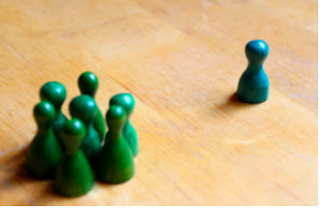Tuesday, September 28: prejudice and discrimination: Claude McKay's America; finishing up denotation and connotation
As we did not finish the denotation/ connotation exercises from yesterday, I copied yesterday's blog onto today's and added addtional material. We are finishing up the exercises in class.
DUE FOR WEDNESDAY, SEPTEMBER 30:
1.Read the Claude McKay poem
2. Copy and paste the four questions that follow onto a google doc
3. Select the correct response
4. Share with me. (dorothy.parker or 2006630) either pop up my name on the drop down menu.
5. This is due by 6 pm Wednesday, September 30
********************************************************************************








- Choose the correct word in each sentence below. When you have finished, click on the "Check My Work" button to view the answers._____1. Hollywood (A. B. ) romance and glittering success.
_____2. When politicians answer questions, hesitation may (A. connote) - (B. denote) weakness or ignorance on a topic.
______3. A flashing yellow light on a highway (A. connotes) - (D. denotes) caution.
_______4. The term skinny has a negative (A.connotation B. denotation ) while "slender" has a positive one.
______5. Fuel (A. connotes B. denotes ) a substance burned to produce heat or power.
______6. To some, the word school (A. connotes B. denotes ) confinement, but it may suggest intellectual excitement or sociability to others.
_______7. The (A. connotative B. denotative ) meanings of words are usually neutral.
______8. Both cheap and inexpensive (A. connotes B. denotes ) something that has a low price.
_______9. The word beach (A. connotes B. denotes ) a sandy shore.
_______10. Because the (A.connotation B. denotation) of pushy and assertive are quite different, the two words are not interchangeable.
______11. The word father1. (A. connotes B. denotes ) affection. - ______12. Solid (A. connotes B. denotes ) that something is neither gaseous nor liquid.
______13. The term liberal has taken on many (A. connotations B. denotations) in recent years._______14. Pushy has a negative (A. connotation B. denotation ) while assertive is usually positive.- ______15. Red flares are used to (A. connote B.denote) danger.
For the italicized word, the denoted word, in each of the following eight sentences,
give two potentially positive and two negative connotations. If there is an
| delicious enticing | Stinky nauseating
|
2. 2. Scrapple is an inexpensive meal.
|
|
|
3. Kevin's interest in model cars has turned into a hobby. |
|
|
4. Uncle Henry lives in a hut deep in the woods.
|
|
|
5. My parents are committed conservationists.
|
|
|
6. My old laptop has finally died.
|
|
|
7. The teacher was mildly intimidated by Roland's assertive behavior 8. |
|
|
9. Phileas Fogg was an adventurous traveler.
|
|
|
In Class: 1. How does prejudice emerge?
Nobody is born prejudice, yet throughout history, we continue to form opinions about people who look or act differently than we do. How does prejudice emerge in a person or society?
2. What are the effects of prejudice?
How have our individual prejudices seeped into our customs, laws and institutions? How has prejudice played a part in our history and how have we responded to these effects?
3. Homework: due tomorrow by 6pm, unless you receive extended time. We are reading Claude McKay's sonnet America as a class. Please copy and paste the four questions that follow onto a google doc and submit.
As you read, take note of the figurative language device of imagery. Think about how the five different senses are employed to give depth of thought and feeling to McKay's poem.
 |
| New York skyline 1920's |
AMERICA
As you read, note the use of the figurative language device of imagery* in this sonnet* that communicates the speaker's perspective on America. We will be reviewing the poem's imagery in class on Thursday.
* an English sonnet has 14 lines of 10 syllables per line
*imagery is the use of figurative language to represent the objects, ideas, and actions in such a way that the appeals to the physical senses
1. Although she feeds me bread of bitterness,
And sinks into my throat her tiger’s tooth,
Stealing my breath of life, I will confess
I love this cultured hell that tests my youth.
5. Her vigor flows like tides into my blood,
Giving me strength erect against her hate,
Her bigness sweeps my being like a flood.
Yet, as a rebel fronts a king in state,
I stand within her walls with not a shred
10. Of terror, malice, not a word of jeer.
Darkly I gaze into the days ahead,
And see her might and granite wonders there,
Beneath the touch of Time’s unerring hand,
Like priceless treasures sinking in the sand.
Text-Dependent Questions Directions:
For the following questions, choose the best answer or respond in complete sentences
Please write in the
correct letter.
Question1_________________
1. PART A: Which of the following best describes the
speaker’s feelings about America?
A. The speaker has
experienced both good and bad things in America, and thus
remains indifferent.
B. The speaker despises
America and has decided to speak out about their bad
experiences.
C. The speaker has a
love-hate relationship with America, but ultimately has lost
faith in the country.
D. The speaker dislikes
and has lost faith in America and believes that it will not last
as it is.
Question 2______________________
2. PART B: Which of the following quotes best supports the
answer to Part A?
A. “Although she feeds
me bread of bitterness, / And sinks into my throat her
tiger’s tooth, /
Stealing my breath of life, I will confess / I love this cultured hell
that tests my youth.”
(Lines 1-4)
B. “Her vigor flows
like tides into my blood, / Giving me strength erect against her
hate” (Lines 5-6)
C. “Yet, as a rebel
fronts a king in state, / I stand within her walls with not a shred--
/ Of terror, malice,
not a word of jeer.” (Lines 8-10)
D. “Darkly I gaze into
the days ahead, / And see her might and granite wonders
there” (Lines 11-12)
Question
3_____________________________
3. PART A: In line 11, the word “darkly” is most likely used
to convey which of the following?
A. The word “darkly”
conveys the speaker has an overall cynical opinion of America.
B. The word “darkly”
conveys the speaker’s general fear of time.
C. The word “darkly”
conveys the speaker’s uncertainty about the future of
America.
D. The word “darkly”
conveys that the speaker does not actually know anything
about America.
Question
4_________________________________
4. PART B: Which of the
following phrases supports the answer to Part A?
A. “I gaze into the
days ahead” (Line 11)
B. “might and granite
wonders” (Line 12)
C. “the Touch of Time’s
unerring hand” (Line 13)
D. “priceless treasures
sinking in the sand” (Line 14)








Comments
Post a Comment